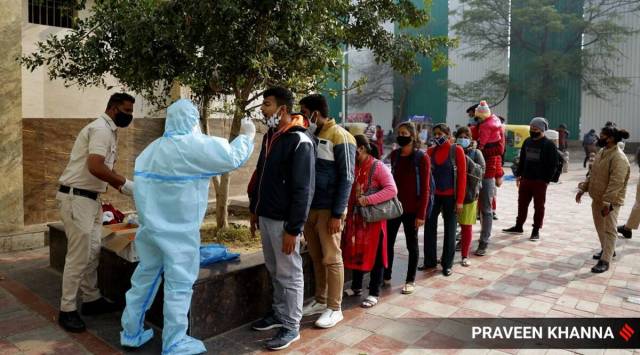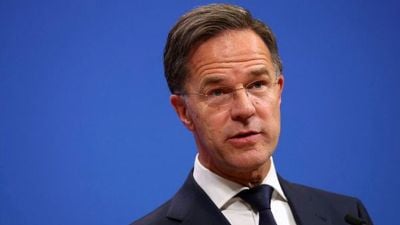Omicron-driven surge: Capital first to tighten Covid curbs, orders weekend curfew
The national capital is the first major metro to announce such stringent curbs, as a fresh Covid wave, driven largely by the more transmissible Omicron variant, sweeps across the country.
 A healthcare worker collects Covid-19 test swab sample in New Delhi.
A healthcare worker collects Covid-19 test swab sample in New Delhi.On a day the national capital reported 5,481 Covid cases and Chief Minister Arvind Kejriwal tested positive for the virus, the Delhi Disaster Management Authority (DDMA) decided to impose a weekend curfew in the city.
Officials said that all services, except shops selling essential items such as groceries, will be shut over the weekend. This includes malls, markets and restaurants. Since a night curfew is already in place, the curfew will be in effect between 10 pm Friday and 5 am Monday.
The national capital is the first major metro to announce such stringent curbs, as a fresh Covid wave, driven largely by the more transmissible Omicron variant, sweeps across the country.
According to the Delhi government’s health bulletin issued on Tuesday, 5,481 cases were reported at a positivity rate of 8.37 per cent, up more than two percentage points in a day. There are 531 people admitted in hospitals, up from 420 on Monday. Of these, 308 are asymptomatic or have mild symptoms and 168 are on oxygen support, up from 124 on Monday. The number of patients on ventilator support, however, has doubled to 14 in a day’s time.
Announcing the weekend curfew, Deputy Chief Minister Manish Sisodia said that while the hospitalisation rate over the past two weeks remains low, caution needs to be exercised to ensure that healthcare facilities are not overwhelmed.
“The graph of Omicron cases is up across the world. The good thing is that international trends show that the variant is not causing severe disease. In Delhi, too, the same trend persists. Experts believe that Omicron mostly causes mild symptoms, or asymptomatic disease, and the recovery is quick. But we do have to be careful and follow Covid appropriate behaviour. Experts believe that unless your oxygen is dropping, home isolation is the best bet. The government is wary and doesn’t want the disease to spread, so that resources can be managed better,” Sisodia said.
He said that all Delhi government officials, except those involved in essential duties, will work from home. Private offices have been asked to curtail staff at 50 per cent strength.
The earlier curbs on public transport, whereby the permitted occupancy was restricted to 50 per cent of total seats, has been removed. Sisodia said this was being done to ensure no crowding or lines at bus stops and Metro stations, which have been witness to agitated passengers of late.
“We saw in some cases that because the seating capacity in buses was curtailed, long lines and crowds were seen at bus stops. These places were at a risk of becoming super-spreaders. We have decided that buses and Metros will now run at full capacity, but no one will be allowed in without masks. This is being done to ensure there is no crowding at stations and bus stops,” he said.
As part of curbs put in place last week, all educational institutions in the city are shut, as are cinema halls, gyms and yoga studios. Restaurants are functioning at 50 per cent capacity.
The Delhi government has been wary of announcing a complete lockdown, fearing a repeat of the migrant worker exodus seen in March-April 2020 and then again in April 2021.
The first lockdown in Delhi was announced on March 23, 2020, two days before the national lockdown was announced. At the time, there were 30 Covid cases in the city, and 23 hospital admissions.
The second lockdown was announced by the Delhi government on April 19, in the midst of the second Covid wave, on a day that 23,686 cases were reported in a day at a positivity rate of over 26 per cent. Over 15,000 beds were occupied at the time. The second wave was particularly deadly, and healthcare facilities were soon overwhelmed, leading to several patients in need of hospitalisation being left in the lurch.







